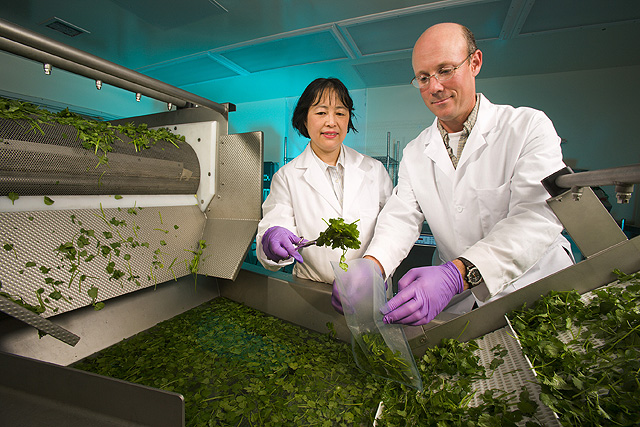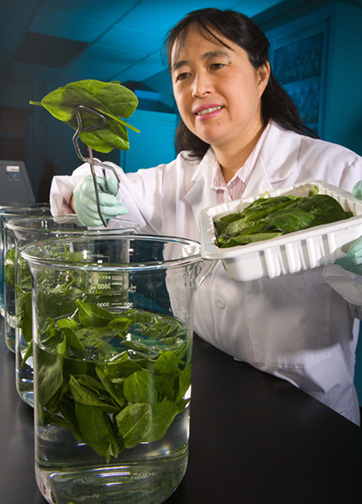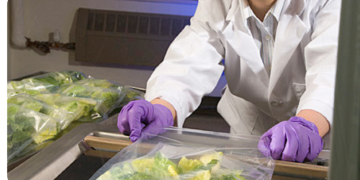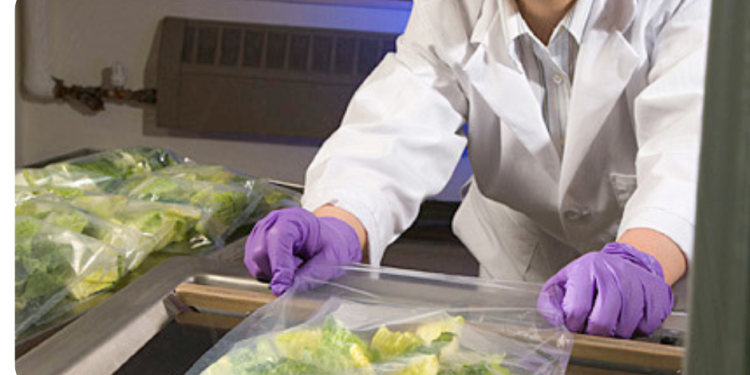Yaguang Luo is a Senior Scientist in ARS’s Environmental Microbial and Food Safety Laboratory and Food Quality Laboratory in Beltsville, MD. Her research targets a broad spectrum of food safety and quality issues in the food supply chain, especially washing and sanitizing fresh vegetables.
Welcome Dr. Luo to Under the Microscope:
UM – Bagged leafy greens continue to be in the news, mainly due to E.coli O157:H7 outbreaks and subsequent product recalls. Through your research, what have you found can trigger the spread of pathogens that cause these outbreaks in produce?
YL – First, I am glad you used the term E.coli O157:H7 rather than just E.coli since not all E.coli cells are made equal. For lettuce and other leafy greens, it is the pathogenic strain, such as E.coli O157:H7, that has been causing the outbreaks.
Pathogen contamination, cross-contamination, and proliferation are major issues and thus have been the focus of our studies. Our seminal research identified an important yet overlooked food safety risk factor during fresh-cut produce wash operations: pathogen cross-contamination. In general, the produce wash process is designed to remove and kill harmful bacteria (if present). However, if not controlled well, this process can instead cause significant spread of bacteria from contaminated to previously uncontaminated produce.
The key is to ensure that enough antimicrobial agent or sanitizer is present in the wash water, but finding the right sanitizer concentration – minimal but effective – is easier said than done. To make sure it is effective and practical, we had to balance many factors, including sanitizer dose-time response for pathogen inactivation, water and chemical usage, process throughput, chlorine disinfection byproduct, wastewater disposal, product quality, and production cost, etc.
UM – Have you shared this research with the fresh-cut leafy green industry, and how have they responded?
YL – Yes, and the industry considered our studies as “groundbreaking.” The follow up joint effort with FDA and the industry created industry guidelines to prevent pathogen cross-contamination and spread during leafy green wash operations ( https://www.producefoodsafety.org/publications). We recommended 10 parts per million (ppm) free chlorine with pH levels maintained around 5.5 and 7.0, if possible. Increasing chlorine concentration above 10 ppm free chlorine will certainly be more effective at preventing pathogen cross-contamination but not all processors can achieve it.

We worked closely with the industry in developing and validating technologies for a better process control, and for improved pathogen reduction. The industry made huge strides in food safety over the past decade, ever since the 2006 E.coli O157:H7 outbreak involving baby spinach. In recent years, a lot of effort has been placed on prevention of pathogen contamination, and it has resulted in stricter farming practices, better farm worker training, industry-wide food safety standards, supply chain joint efforts to improve food safety, and industry-sponsored research initiatives.
UM – Some processors or food service operators prepare their produce by washing followed by disinfection. Do they need to use sanitizer if their intention is to “wash” not “disinfect” produce?
YL – Yes. Bacteria do not care about washing vs. disinfection. When you submerge a piece of contaminated produce in water, some bacteria will be washed off from produce surface. Without sanitizer, they will survive in water and reattach to previously clean and uncontaminated produce, causing wider spread of bacteria and food safety problems. Once that happens, subsequent disinfection cannot undo this contamination. When submerging lettuce in water during washing, there must be adequate sanitizer present in the water, even if the intention is to “wash” not “disinfect.” This is especially important when you handle a large quantity of lettuce.
UM – Once the bagged lettuce leaves the main facility, another issue arises with possible temperature abuse. What can shippers, retailers, and consumers do to minimize this issue?
YL – Once contaminated, E.coli O157:H7 can multiply rapidly on fresh-cut produce when stored within a certain temperature range. You know the saying, “the three most critical factors for buying a house are location, location, and location?” For bagged salad, three critical factors to limit pathogen proliferation are “temperature, temperature, and temperature.”
Under 41°F, the growth of E.coli O157:H7 is minimal, although it can survive. But as our studies demonstrated, at elevated temperatures, especially above 45°F, E.coli O157:H7 cells multiply rapidly, and increase their population by more than 10- or 100-fold within a few days. Therefore, it’s critical that all handlers keep bagged salad at less than 41°F at all times.
UM – Can you further explain the implications of temperature abuse?
YL – Sure. If the pathogen contamination level is very low, it may or may not make people sick, depending on the infectious dose of certain pathogens and the health conditions of the consumers. However, with temperature abuse, a few bacterial cells can grow to dozens, hundreds, or even thousands of cells, which can be harmful to human health. Since there is no way to tell if a bagged salad is contaminated or not, temperature control is critical for food safety.
UM – Speaking of temperature variance, one of your research projects compared open vs. closed display cases, both commonly found in grocery stores. What were your findings?
YL – The U.S. Food Code requires that all packaged fresh-cut leafy greens be maintained at 41°F or less at all times for food safety. In retail environments, these products are often displayed in open refrigerated cases that have large temperature variations. It is very difficult to keep the temperature cold enough in the front of the display without freezing the product in the rear. Many high-tech technologies that we tried so far either did not work or were cost-prohibitive.
Retrofitting an open case with clear glass doors was the most cost-effective approach to enable compliance with U.S. Food Code. Enclosing the cases with doors prevented heat exchange between the cold case and the warm ambient in the stores and made it much easier to maintain consistently low, yet above-freezing, temperatures throughout the display case, which prevented growth of human pathogens such as E. coli O157:H7 and Salmonella enterica. We also found that maintaining a lower temperature benefited product quality and shelf life, and retrofitting cases with doors significantly reduced energy consumption.
.

Food technologist Yaguang Luo is studying various wash waters and sanitizers to enhance the microbial safety of spinach (shown here), lettuce, and other leafy greens. (Peggy Greb, D1167-1)
UM – What advice do you have for consumers who prefer bagged lettuce?.
YL – Keep your salads cold at all times. Make sure that your home refrigerator is set at below 41°F and keep your product as cold as possible when driving home from your local grocery store. Also remember that if the bagged lettuce is already contaminated with pathogenic E.coli, simply washing it at home is not effective.
UM – I understand you are currently researching how to reduce Salmonella outbreaks from tomatoes. What research progress have you made?
YL – We’ve been working on this for a long time, looking at a myriad of factors, from identifying packing house operation conditions for preventing bacteria (Salmonella) internalization, to determining tomato wash conditions to eliminate Salmonella’s spread. Our findings were used by the industry to develop “Commodity Specific Food Safety Guidelines for the Fresh Tomato Supply Chain,” adoption of which will reduce microbial hazards associated with fresh and fresh-cut tomatoes.
UM – What can fresh-cut tomato processors and consumers do to minimize food safety risks?
YL – Remove the stem-scars and the core tissue immediately underneath the stem-scars since the vast majority of bacteria are located in these areas. These materials are corky and do not taste good anyway.
– USDA ARS’ Under the Microscope































